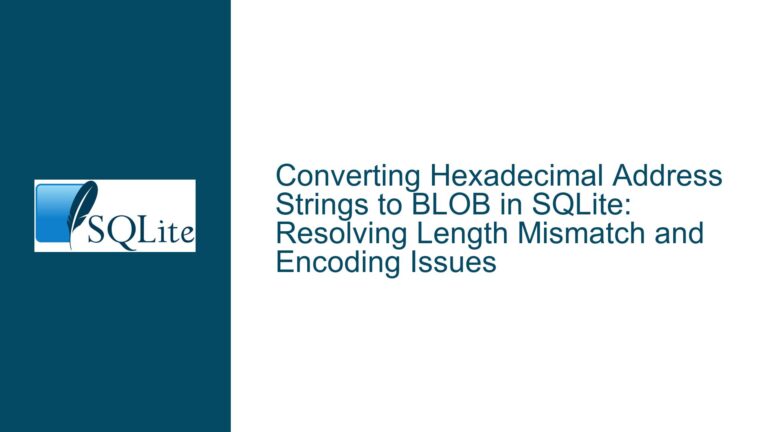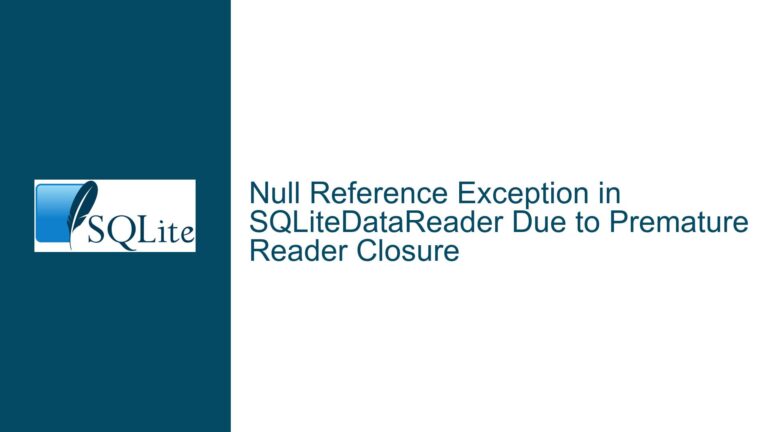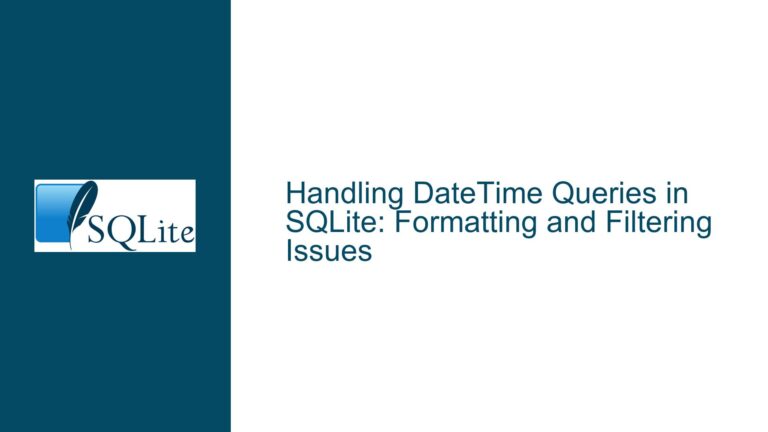Identifying INTEGER PRIMARY KEY Columns Acting as rowid Aliases in SQLite
Understanding Rowid Behavior and Column Identification Challenges
In SQLite, the rowid is a built-in integer column that uniquely identifies each row in a table. When a column is explicitly defined as INTEGER PRIMARY KEY, it becomes an alias for this internal rowid value. However, several factors complicate the reliable identification of such columns:
- Schema Design Variations: Tables may use explicit
WITHOUT ROWIDdeclarations, composite primary keys, or unconventional column definitions that affect rowid behavior - Pragma Limitations: While
pragma_table_infoprovides column metadata, it doesn’t directly indicate rowid aliasing relationships - Historical Quirks: Legacy behaviors like the
INTEGER PRIMARY KEY DESCanomaly create special cases that require handling - Index Interactions: Automatic index creation for primary keys can mask underlying rowid status
The core challenge lies in distinguishing between true rowid alias columns and columns that merely resemble them through superficial metadata characteristics. A robust solution must account for multiple edge cases while maintaining compatibility across SQLite versions.
Critical Edge Cases Affecting Rowid Column Identification
1. WITHOUT ROWID Table Declaration
Tables created with explicit WITHOUT ROWID clauses fundamentally alter rowid behavior:
CREATE TABLE invalid_rowid (
id INTEGER PRIMARY KEY,
data TEXT
) WITHOUT ROWID;
In this scenario, the id column becomes a regular primary key rather than a rowid alias, despite matching the INTEGER PRIMARY KEY pattern.
2. Composite Primary Key Configurations
Multi-column primary keys automatically disqualify all constituent columns from being rowid aliases:
CREATE TABLE composite_pk (
part1 INTEGER,
part2 TEXT,
data BLOB,
PRIMARY KEY (part1, part2)
);
Here, neither part1 nor part2 can serve as rowid aliases due to the composite nature of the primary key.
3. DESC Ordering in Primary Key Definition
The SQLite documentation notes a persistent quirk with descending ordered primary keys:
CREATE TABLE desc_pk_quirk (
id INTEGER PRIMARY KEY DESC,
content TEXT
);
Despite appearing similar to valid rowid alias declarations, the DESC modifier prevents id from becoming a true rowid alias while still allowing it to function as primary key.
4. Implicit Index Creation Patterns
SQLite automatically creates unique indexes for primary keys in rowid tables. The presence/absence of these indexes provides crucial metadata:
-- Rowid table creates implicit index
CREATE TABLE valid_rowid (
id INTEGER PRIMARY KEY,
info TEXT
);
-- WITHOUT ROWID table creates different index structure
CREATE TABLE without_rowid (
pk INTEGER PRIMARY KEY,
data BLOB
) WITHOUT ROWID;
The pragma_index_list output differs between these cases, offering a detection mechanism for true rowid alias status.
5. Nullability Constraints
Rowid alias columns exhibit special nullability behavior:
CREATE TABLE nullable_check (
id INTEGER PRIMARY KEY,
non_null_id INTEGER NOT NULL PRIMARY KEY
) WITHOUT ROWID;
In rowid tables, the INTEGER PRIMARY KEY column is automatically constrained as NOT NULL, while explicit NOT NULL declarations in WITHOUT ROWID tables behave differently.
Comprehensive Identification Methodology
Step 1: Establish Table Eligibility
First filter tables that qualify for potential rowid alias columns:
SELECT name AS table_name
FROM pragma_table_list
WHERE
type = 'table' AND
schema = 'main' AND
name NOT LIKE 'sqlite_%' AND
rowid = TRUE;
This preliminary step:
- Excludes system tables and attached databases
- Filters virtual tables and shadow objects
- Uses
rowidpragma column to confirm table type
Step 2: Analyze Primary Key Structure
For eligible tables, examine primary key composition using combined pragma data:
SELECT
ti.table_name,
ti.name AS column_name,
ti.type AS data_type,
ti.pk AS pk_rank,
il.origin AS index_origin
FROM pragma_table_info('target_table') ti
LEFT JOIN pragma_index_list('target_table') il
ON il.origin = 'pk'
WHERE ti.pk > 0;
Key analysis points:
pk_rank> 1 indicates composite primary keys- Missing
index_originsuggests WITHOUT ROWID table - Single
pk_rankwith existingindex_originhints at rowid alias candidate
Step 3: Validate Column Qualifications
For potential candidate columns, apply final validation checks:
SELECT
ti.name AS candidate_column,
ti.type = 'INTEGER' AS is_integer_type,
ti.notnull = 1 AS has_notnull_constraint,
(SELECT COUNT(*) FROM pragma_index_list(ti.table_name)
WHERE origin = 'pk') AS pk_index_count
FROM pragma_table_info('target_table') ti
WHERE
ti.pk = 1 AND
(SELECT SUM(pk) FROM pragma_table_info(ti.table_name)) = 1;
Validation criteria:
- Strict INTEGER type (no type affinity mismatches)
- Implicit NOT NULL constraint validation
- Single-column primary key confirmation
- Presence of automatic primary key index
Step 4: Cross-Pragma Verification
Final confirmation using combined pragma data joins:
SELECT
tl.name AS table_name,
ti.name AS rowid_alias_column
FROM pragma_table_list tl
INNER JOIN pragma_table_info(tl.name) ti
ON ti.pk > 0
LEFT JOIN pragma_index_list(tl.name) il
ON il.origin = 'pk'
WHERE
tl.type = 'table' AND
tl.schema = 'main' AND
il.origin IS NULL AND
ti.type = 'INTEGER' AND
(SELECT SUM(pk) FROM pragma_table_info(tl.name)) = 1
GROUP BY tl.name
HAVING COUNT(ti.name) = 1;
This comprehensive approach:
- Joins table metadata with column and index info
- Filters out composite keys via SUM(pk) check
- Excludes WITHOUT ROWID tables via index origin
- Validates single INTEGER primary key existence
Special Case Handling Procedures
1. DESC Primary Key Quirk Mitigation
Handle descending-ordered primary keys by checking pk_desc field:
SELECT
ti.name,
ii.pk_desc
FROM pragma_table_info('desc_table') ti
INNER JOIN pragma_index_xinfo('desc_table_index') ii
ON ii.name = ti.name
WHERE ti.pk > 0;
A pk_desc value of 1 indicates DESC ordering, disqualifying the column from being a rowid alias.
2. WITHOUT ROWID Exclusion Technique
Positive identification of WITHOUT ROWID tables using schema parsing:
SELECT
name AS table_name,
sql LIKE '%WITHOUT ROWID%' AS is_without_rowid
FROM sqlite_master
WHERE type = 'table';
Combine this with pragma_table_info checks to exclude non-eligible tables early in analysis.
3. Type Affinity Resolution
Account for SQLite’s type affinity system when checking INTEGER types:
SELECT
name,
type,
CASE
WHEN type LIKE 'INT%' THEN 1
WHEN type = '' THEN 1 -- No type specified implies INTEGER affinity
ELSE 0
END AS is_integer_affinity
FROM pragma_table_info('target_table');
This handles cases where columns might have type affinity through inheritance rather than explicit declaration.
Optimized Detection Query
The final optimized query incorporating all edge case handling:
SELECT
tl.name AS table_name,
ti.name AS rowid_alias_column
FROM pragma_table_list tl
INNER JOIN pragma_table_info(tl.name) ti
ON ti.pk = 1
LEFT JOIN pragma_index_list(tl.name) il
ON il.origin = 'pk'
WHERE
tl.type = 'table' AND
tl.schema = 'main' AND
tl.name NOT LIKE 'sqlite_%' AND
il.origin IS NULL AND
ti.type COLLATE NOCASE IN ('INTEGER', 'INT', 'TINYINT', 'SMALLINT', 'MEDIUMINT', 'BIGINT', 'UNSIGNED BIG INT', 'INT2', 'INT8') AND
(SELECT SUM(pk) FROM pragma_table_info(tl.name)) = 1 AND
(SELECT sql FROM sqlite_master WHERE type = 'table' AND name = tl.name) NOT LIKE '%WITHOUT%ROWID%'
GROUP BY tl.name
HAVING tl.rowid = 1;
Key components:
- Comprehensive INTEGER type checking with COLLATE NOCASE
- Explicit WITHOUT ROWID exclusion
- Schema master validation
- rowid pragma confirmation
- Composite key prevention through SUM(pk)
Verification and Testing Methodology
1. Test Case Matrix
Create validation tables covering all edge cases:
-- Valid rowid alias
CREATE TABLE valid1 (id INTEGER PRIMARY KEY, data TEXT);
-- WITHOUT ROWID exclusion
CREATE TABLE invalid1 (id INTEGER PRIMARY KEY, content BLOB) WITHOUT ROWID;
-- Composite primary key
CREATE TABLE invalid2 (a INT, b TEXT, PRIMARY KEY(a,b));
-- DESC ordering quirk
CREATE TABLE invalid3 (id INTEGER PRIMARY KEY DESC, notes TEXT);
-- Integer type variations
CREATE TABLE valid2 (oid INT8 PRIMARY KEY, info TEXT);
-- No primary key (implicit rowid)
CREATE TABLE implicit_rowid (data TEXT);
-- Multiple PK columns with INTEGER
CREATE TABLE invalid4 (a INTEGER, b INTEGER, PRIMARY KEY(a,b));
2. Automated Verification Script
Execute detection query and validate against expected results:
SELECT
detected.table_name,
CASE
WHEN expected.rowid_col IS NOT NULL AND detected.rowid_col IS NOT NULL THEN 'OK'
WHEN expected.rowid_col IS NULL AND detected.rowid_col IS NULL THEN 'OK'
ELSE 'FAIL'
END AS status
FROM (
-- Insert detection query here
) detected
FULL OUTER JOIN (
VALUES
('valid1', 'id'),
('valid2', 'oid'),
('invalid1', NULL),
('invalid2', NULL),
('invalid3', NULL),
('implicit_rowid', NULL),
('invalid4', NULL)
) expected(table_name, rowid_col)
ON detected.table_name = expected.table_name;
3. Performance Considerations
- Pragma Caching: SQLite 3.16.0+ allows PRAGMA functions in queries, but multiple calls benefit from temporary table caching
- Index Scans: On large schemas, materialize pragma results first:
WITH table_list AS MATERIALIZED (
SELECT name FROM pragma_table_list WHERE schema = 'main'
),
table_info AS MATERIALIZED (
SELECT * FROM pragma_table_info((SELECT name FROM table_list))
),
index_list AS MATERIALIZED (
SELECT * FROM pragma_index_list((SELECT name FROM table_list))
)
-- Main query using materialized CTEs
Maintenance and Compatibility
1. Version-Specific Adaptations
- SQLite <3.16.0: Use temporary tables instead of direct pragma joins
- SQLite 3.33.0+: Leverage
pragma_table_xinfofor additional hidden column info - SQLite 3.37.0+: Utilize
pragma_table_listschema column for attached database support
2. Schema Modification Triggers
Implement update hooks to maintain a rowid alias registry:
CREATE TABLE rowid_alias_registry (
table_name TEXT PRIMARY KEY,
alias_column TEXT NOT NULL,
detection_time DATETIME DEFAULT CURRENT_TIMESTAMP
);
CREATE TRIGGER schema_update_hook AFTER CREATE ON DATABASE
BEGIN
DELETE FROM rowid_alias_registry WHERE table_name = new.name;
INSERT INTO rowid_alias_registry(table_name, alias_column)
SELECT tl.name, ti.name
FROM pragma_table_list(new.name) tl
INNER JOIN pragma_table_info(new.name) ti
ON ti.pk = 1
LEFT JOIN pragma_index_list(new.name) il
ON il.origin = 'pk'
WHERE
tl.type = 'table' AND
il.origin IS NULL AND
ti.type COLLATE NOCASE LIKE 'INT%' AND
(SELECT SUM(pk) FROM pragma_table_info(tl.name)) = 1;
END;
Alternative Approaches and Tradeoffs
1. sqlite_master Parsing
Direct SQL parsing from schema storage:
SELECT
name AS table_name,
TRIM(SUBSTR(sql, INSTR(sql, 'INTEGER PRIMARY KEY'))) AS pk_def
FROM sqlite_master
WHERE type = 'table' AND sql LIKE '%INTEGER%PRIMARY%KEY%';
Advantages:
- Avoids pragma overhead
- Direct access to original DDL
Disadvantages:
- Complex pattern matching
- Misses ALTER TABLE modifications
- Doesn’t account for type affinity
2. Foreign Key Integration
Cross-reference foreign key relationships:
SELECT
fk."table" AS source_table,
fk."from" AS source_column,
ti.name AS potential_rowid
FROM pragma_foreign_key_list('related_table') fk
JOIN pragma_table_info(fk."table") ti
ON ti.name = fk."from" AND ti.pk = 1;
Use Case: Identify commonly referenced columns that likely serve as rowid aliases
3. Extension Functions
Create custom C extension for direct rowid metadata:
#include <sqlite3ext.h>
SQLITE_EXTENSION_INIT1
static void getRowidColumn(
sqlite3_context *context,
int argc,
sqlite3_value **argv
) {
const char *table = (const char*)sqlite3_value_text(argv[0]);
sqlite3 *db = sqlite3_context_db_handle(context);
// Implementation checking internal schema structures
// ...
}
int sqlite3_rowidcol_init(
sqlite3 *db,
char **pzErrMsg,
const sqlite3_api_routines *pApi
) {
SQLITE_EXTENSION_INIT2(pApi);
sqlite3_create_function(db, "get_rowid_column", 1,
SQLITE_UTF8, 0, getRowidColumn, 0, 0);
return SQLITE_OK;
}
Advantages:
- Direct access to internal schema data
- Bypass complex SQL logic
Disadvantages:
- Requires native code compilation
- Version compatibility maintenance
Diagnostic Toolkit
1. Schema Analysis Report
Generate comprehensive schema health check:
SELECT
tl.name AS table_name,
ti.name AS pk_column,
ti.type AS pk_type,
tl.rowid AS has_rowid,
il.origin AS pk_index_origin,
(SELECT SUM(pk) FROM pragma_table_info(tl.name)) AS pk_col_count,
(sm.sql LIKE '%WITHOUT%ROWID%') AS explicit_without_rowid
FROM pragma_table_list tl
LEFT JOIN pragma_table_info(tl.name) ti
ON ti.pk > 0
LEFT JOIN pragma_index_list(tl.name) il
ON il.origin = 'pk'
LEFT JOIN sqlite_master sm
ON sm.name = tl.name AND sm.type = 'table'
WHERE tl.schema = 'main';
2. Anomaly Detection Queries
Identify schema patterns requiring special handling:
A. Potential DESC Primary Key Quirk
SELECT
name AS table_name,
sql LIKE '%INTEGER%PRIMARY%KEY%DESC%' AS has_desc_pk
FROM sqlite_master
WHERE type = 'table';
B. Implicit Rowid Size Checks
SELECT
name AS table_name,
CASE
WHEN rowid = (SELECT MAX(rowid) FROM "||name||")
THEN 'Dense' ELSE 'Sparse'
END AS rowid_distribution
FROM pragma_table_list
WHERE rowid = 1;
C. Type Affinity Mismatches
SELECT
table_name,
name AS column_name,
type AS declared_type,
affinity(type) AS actual_affinity
FROM pragma_table_info('target_table')
WHERE pk > 0;
Performance Optimization Strategies
1. Materialized View Caching
For frequently accessed metadata:
CREATE TABLE schema_metadata_cache (
table_name TEXT PRIMARY KEY,
rowid_column TEXT,
has_rowid BOOLEAN,
pk_columns TEXT,
last_updated DATETIME
);
CREATE TRIGGER cache_update AFTER COMMIT
BEGIN
DELETE FROM schema_metadata_cache;
INSERT INTO schema_metadata_cache
SELECT
tl.name,
ti.name,
tl.rowid,
(SELECT GROUP_CONCAT(name) FROM pragma_table_info(tl.name) WHERE pk > 0),
CURRENT_TIMESTAMP
FROM pragma_table_list tl
LEFT JOIN pragma_table_info(tl.name) ti
ON ti.pk = 1 AND (SELECT SUM(pk) FROM pragma_table_info(tl.name)) = 1
WHERE tl.schema = 'main';
END;
2. Partial Indexing for Metadata Queries
Optimize frequent lookups:
CREATE INDEX idx_rowid_tables ON pragma_table_list(schema)
WHERE rowid = 1;
CREATE INDEX idx_single_pk ON sqlite_master(
SUBSTR(sql, INSTR(sql, 'PRIMARY KEY'))
) WHERE type = 'table';
3. Prepared Statement Reuse
When implementing in applications:
/* SQLite C API example */
sqlite3_stmt *pStmt;
const char *query =
"SELECT ti.name FROM pragma_table_info(?1) ti "
"WHERE ti.pk = 1 AND ..."; /* Truncated for brevity */
sqlite3_prepare_v3(db, query, -1, SQLITE_PREPARE_PERSISTENT, &pStmt, NULL);
/* Reuse across multiple table checks */
sqlite3_bind_text(pStmt, 1, "target_table", -1, SQLITE_STATIC);
while (sqlite3_step(pStmt) == SQLITE_ROW) {
/* Process results */
}
sqlite3_reset(pStmt);






